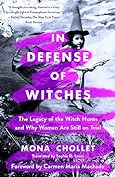More on this book
Community
Kindle Notes & Highlights
by
Mona Chollet
Started reading
January 26, 2024
Women are abused, assaulted, economically disempowered, raped, shoved into the margins, pressured, silenced, ignored, treated as guinea pigs, co-opted, stolen from, misrepresented, forced into pregnancy or servitude, imprisoned, and, yes, sometimes murdered.
Every possible decision modern women make or role they occupy, outside of the most rigorous and regressive, can be tied back to the very symptoms of witchcraft: refusal of motherhood, rejection of marriage, ignoring traditional beauty standards, bodily and sexual autonomy, homosexuality, aging, anger, even a general sense of self-determination.
like so many things capitalism touches, she is in danger of dissociating from her radical roots.
The witch embodies woman free of all domination, all limitation; she is an ideal to aim for; she shows us the way.
the witch “was a victim of the Moderns, not the Ancients.”6
tendency of all societies to find a scapegoat for their misfortunes and to lock themselves into a spiral of irrationality, cut off from all reasonable challenge, until the accumulation of hate-filled discourse and obsessional hostility justify a turn to physical violence, perceived as the legitimate defense of a beleaguered society.
Witch-hunters are revealed as both obsessed with and terrified by female sexuality.
historians seem determined to deny that witch-hunts constituted “a burst of misogyny without parallel in Western history.”
She discerns here a manifestation of the “deeply embedded tendency in our society to hold women ultimately responsible for the violence committed against them.”
“Feminism encourages women to leave their husbands, kill their children, practice witchcraft, destroy capitalism and become lesbians,” the American televangelist Pat Robertson railed as recently as 1992, in a speech that remains famous (and prompted many to respond, “Where do we sign up?”).
We are always looking for life’s meaning, for meaning in our own lives, and why and how and where-am-I-going and who-am-I and what-will-I-become,
The hunts both translated and amped up prejudices about women, especially the stigma that attaches to some women. The hunts effectively repressed certain behaviors and lifestyles.
Women’s bond with men and with children, carried out in the mode of selflessness, is still considered the core of their identity.
the witch-hunts paved the way for the gendered labor division required by capitalism,
the history of witchcraft could equally be called the history of independence. Anyway, a married witch, like in Bewitched, is peculiar […] Those in power must constantly be making examples out of people, demonstrating that we couldn’t go on without them. On the international political level, the most troubled territories are always those that want to be independent.66
He sets fire to his wife and his apartment is gutted”), as if the victim were a piece of furniture and the key news item were the burned-out apartment; the journalist almost seems to find the husband’s clumsiness cause for humor.
Not only does a vast portion of women’s identities become folded into their domestic and maternal roles, but they are lumbered with the least rewarding aspects of parenting.
When they reach adulthood, suddenly, by some weird hocus-pocus, everyone decides that women should no longer be trying to succeed in their own lives, but rather, more than anything, should be aiming to succeed in their family lives—


